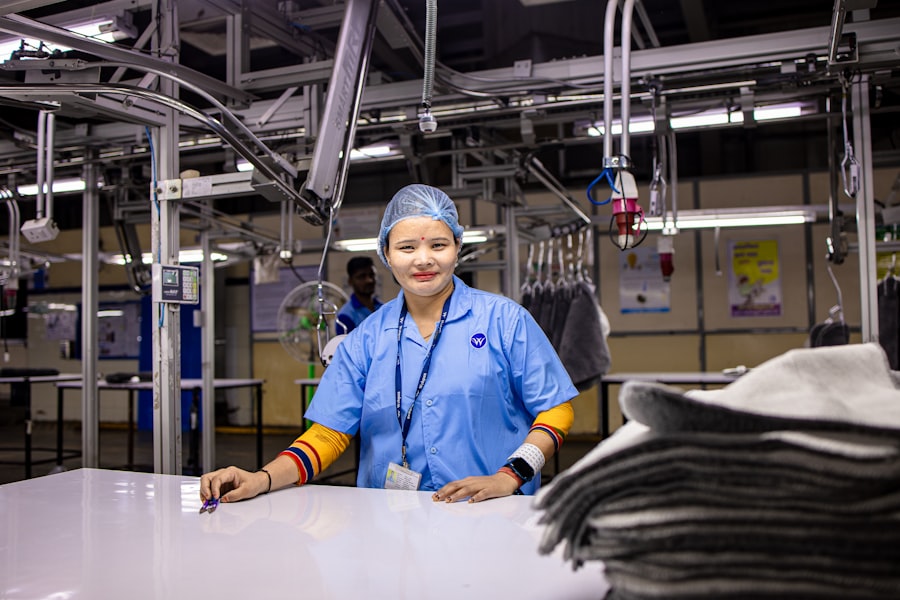As you navigate through the modern landscape of industry, it becomes increasingly evident that artificial intelligence (AI) is not just a fleeting trend but a transformative force reshaping the way businesses operate. In manufacturing and customer service, AI technologies are being integrated at an unprecedented pace, leading to enhanced efficiency, productivity, and customer satisfaction. The rise of AI is not merely about automation; it represents a paradigm shift in how you approach problem-solving and decision-making within these sectors.
You may have noticed that AI systems are now capable of analyzing vast amounts of data, predicting trends, and even personalizing customer interactions. This evolution is driven by advancements in machine learning, natural language processing, and robotics, which collectively empower organizations to streamline operations and improve service delivery. As you delve deeper into this topic, it becomes clear that the implications of AI extend far beyond mere operational enhancements; they touch upon the very fabric of workforce dynamics and customer relationships.
Key Takeaways
- AI is revolutionizing the manufacturing industry by improving efficiency, reducing errors, and enabling predictive maintenance.
- The impact of AI on customer service jobs is significant, with chatbots and virtual assistants handling routine inquiries and freeing up human agents for more complex tasks.
- The benefits of AI in manufacturing include increased productivity and quality, while challenges include high implementation costs and the need for skilled workers to operate and maintain AI systems.
- AI plays a crucial role in streamlining production processes by optimizing supply chain management, predictive maintenance, and quality control.
- AI is changing the face of customer service by providing personalized experiences, improving response times, and reducing customer wait times.
How AI is Revolutionizing the Manufacturing Industry
In the manufacturing sector, AI is revolutionizing traditional processes by introducing smart technologies that optimize production lines and enhance quality control. You might find it fascinating that AI-driven machines can now monitor production in real-time, identifying inefficiencies and suggesting improvements almost instantaneously. This capability not only reduces waste but also ensures that products meet stringent quality standards, ultimately leading to higher customer satisfaction.
Moreover, predictive maintenance powered by AI algorithms is becoming a game-changer for manufacturers. By analyzing data from machinery and equipment, AI can forecast potential failures before they occur, allowing you to schedule maintenance proactively. This not only minimizes downtime but also extends the lifespan of your equipment, resulting in significant cost savings.
As you consider the implications of these advancements, it becomes clear that AI is not just enhancing manufacturing processes; it is redefining what is possible in terms of efficiency and innovation.
The Impact of AI on Customer Service Jobs

As you explore the impact of AI on customer service jobs, it’s essential to recognize both the opportunities and challenges that arise from this technological shift. On one hand, AI chatbots and virtual assistants are streamlining customer interactions by providing instant responses to inquiries and resolving issues without human intervention. This efficiency can lead to improved customer satisfaction as clients receive timely assistance, allowing your organization to focus on more complex queries that require human empathy and understanding.
However, the rise of AI in customer service also raises concerns about job displacement. You may worry about the future of roles traditionally held by humans, as automated systems take over routine tasks. While it’s true that some positions may become obsolete, it’s important to consider how AI can augment human capabilities rather than replace them entirely.
By automating repetitive tasks, you can free up your workforce to engage in more meaningful interactions with customers, fostering deeper relationships and enhancing overall service quality.
The Benefits and Challenges of AI in Manufacturing
| Benefits of AI in Manufacturing | Challenges of AI in Manufacturing |
|---|---|
| Increased productivity and efficiency | High initial investment costs |
| Improved quality control | Integration with existing systems |
| Predictive maintenance to reduce downtime | Concerns about job displacement |
| Optimized supply chain management | Data security and privacy issues |
| Enhanced worker safety | Complexity of AI implementation |
The integration of AI in manufacturing brings a plethora of benefits that can significantly enhance operational efficiency. You may appreciate how AI can analyze production data to identify bottlenecks and optimize workflows, leading to faster turnaround times and reduced costs. Additionally, AI-driven analytics can provide insights into market trends, enabling you to make informed decisions about product development and inventory management.
However, with these benefits come challenges that must be addressed. Implementing AI technologies often requires substantial investment in infrastructure and training. You might find that smaller manufacturers struggle to keep pace with larger competitors who have the resources to adopt cutting-edge technologies.
Furthermore, there is a learning curve associated with integrating AI into existing systems, which can lead to temporary disruptions in production. Balancing these challenges with the potential rewards is crucial for any organization looking to thrive in an increasingly automated landscape.
The Role of AI in Streamlining Production Processes
AI plays a pivotal role in streamlining production processes by enabling real-time monitoring and data analysis. As you consider the intricacies of modern manufacturing, it becomes apparent that AI systems can track every aspect of production—from raw material usage to final output—providing valuable insights that drive continuous improvement. This level of oversight allows you to identify inefficiencies quickly and implement corrective measures before they escalate into larger issues.
Moreover, AI can facilitate better supply chain management by predicting demand fluctuations and optimizing inventory levels.
This capability not only helps you maintain optimal stock levels but also reduces the risk of overproduction or stockouts, ultimately leading to a more agile and responsive manufacturing operation.
How AI is Changing the Face of Customer Service

In the realm of customer service, AI is fundamentally changing how businesses interact with their clients. You may have experienced this firsthand through chatbots that provide immediate assistance on websites or virtual assistants that help navigate complex queries over the phone. These technologies are designed to enhance user experience by offering quick solutions while maintaining a level of personalization that was previously unattainable through traditional methods.
Furthermore, AI’s ability to analyze customer data allows for tailored interactions that resonate with individual preferences. As you engage with customers, you might notice how AI can suggest products based on past purchases or recommend solutions based on previous interactions. This level of personalization not only improves customer satisfaction but also fosters loyalty as clients feel understood and valued by your brand.
The Future of Jobs in Manufacturing and Customer Service
As you contemplate the future of jobs in manufacturing and customer service amidst the rise of AI, it’s essential to recognize that while some roles may evolve or diminish, new opportunities will also emerge. You might envision a landscape where human workers collaborate with intelligent machines, leveraging their unique skills to enhance productivity and creativity. This symbiotic relationship could lead to the creation of entirely new job categories focused on managing and optimizing AI systems.
Moreover, as businesses increasingly rely on data-driven decision-making, there will be a growing demand for professionals skilled in data analysis and interpretation. You may find yourself considering how roles such as data scientists or AI specialists will become integral to both manufacturing and customer service sectors. Embracing this shift will require adaptability and a willingness to learn new skills as the job market continues to evolve.
Addressing Concerns about Job Displacement Due to AI
The concern over job displacement due to AI is a valid one that resonates with many workers across various industries. As you reflect on this issue, it’s important to acknowledge that while automation may replace certain tasks, it also creates opportunities for new roles that require human insight and creativity. You might consider how industries have historically adapted to technological advancements—often leading to job transformation rather than outright loss.
To address these concerns effectively, organizations must prioritize open communication with their workforce about the changes brought by AI. You may find it beneficial for companies to invest in training programs that equip employees with the skills needed to thrive alongside emerging technologies. By fostering a culture of continuous learning and adaptation, businesses can mitigate fears surrounding job displacement while empowering their workforce to embrace new opportunities.
The Importance of Reskilling and Upskilling for Workers
In an era where technological advancements are rapid and relentless, reskilling and upskilling have become essential for workers across all sectors. As you navigate your career path in manufacturing or customer service, you may realize that staying relevant requires a commitment to lifelong learning. Organizations must recognize this need and invest in training programs that enable employees to acquire new skills aligned with evolving industry demands.
You might consider how reskilling initiatives can empower workers to transition into roles that leverage their existing knowledge while incorporating new technologies. For instance, training programs focused on data analytics or machine learning can prepare employees for positions that involve collaborating with AI systems rather than competing against them. By fostering a culture of growth and development within your organization, you can ensure that your workforce remains adaptable and resilient in the face of change.
Ethical Considerations in the Adoption of AI in the Workplace
As you delve into the ethical considerations surrounding the adoption of AI in the workplace, it becomes clear that responsible implementation is crucial for fostering trust among employees and customers alike. You may ponder questions related to data privacy, algorithmic bias, and transparency in decision-making processes driven by AI systems. Addressing these concerns requires a proactive approach from organizations committed to ethical practices.
Moreover, as you consider the implications of AI on workplace dynamics, it’s essential to ensure that technology is used to enhance human capabilities rather than undermine them. You might advocate for policies that prioritize fairness and inclusivity in AI development, ensuring that diverse perspectives are represented in algorithm design. By fostering an ethical framework around AI adoption, organizations can build trust with their stakeholders while maximizing the benefits of these transformative technologies.
Strategies for Adapting to the AI Revolution in Manufacturing and Customer Service
To successfully adapt to the AI revolution in manufacturing and customer service, organizations must adopt strategic approaches that prioritize innovation while addressing workforce concerns.
This collaborative approach can foster a culture of experimentation where employees feel empowered to contribute ideas for leveraging AI effectively.
Additionally, investing in partnerships with educational institutions or training providers can facilitate access to resources needed for reskilling initiatives. You might consider how organizations can create pathways for employees to transition into new roles through mentorship programs or hands-on training experiences focused on emerging technologies. By prioritizing adaptability and continuous learning, businesses can position themselves at the forefront of the AI revolution while ensuring their workforce remains engaged and equipped for future challenges.
In conclusion, as you reflect on the rise of AI in manufacturing and customer service, it becomes evident that this technological evolution presents both opportunities and challenges. By embracing change through reskilling initiatives, ethical considerations, and strategic adaptation strategies, you can navigate this transformative landscape successfully while ensuring a brighter future for both industries and their workforces.
In recent years, the rapid advancement of artificial intelligence has significantly impacted the job market, with AI taking over various roles traditionally performed by humans. For instance, AI has been increasingly utilized in customer service, data analysis, and even creative fields like content generation and graphic design. A related article that delves into the implications of AI on employment and the economy can be found on the How Wealth Grows website. This article provides insights into how AI is reshaping industries and the potential future of work. For more information, you can read the full article by visiting How Wealth Grows.
FAQs
What jobs have AI taken over?
AI has taken over jobs in various industries such as manufacturing, customer service, data entry, transportation, and healthcare.
How has AI impacted the job market?
AI has led to the automation of repetitive and routine tasks, resulting in the displacement of certain jobs while creating new opportunities in fields such as data analysis, programming, and AI development.
What are some examples of jobs that have been replaced by AI?
Some examples of jobs that have been replaced by AI include assembly line workers in manufacturing, customer service representatives in call centers, and data entry clerks in administrative roles.
What are the benefits of AI taking over certain jobs?
The benefits of AI taking over certain jobs include increased efficiency, reduced human error, and the ability for humans to focus on more complex and creative tasks.
What are the potential challenges of AI taking over jobs?
The potential challenges of AI taking over jobs include job displacement, the need for retraining and upskilling of workers, and concerns about the ethical and social implications of AI replacing human labor.
